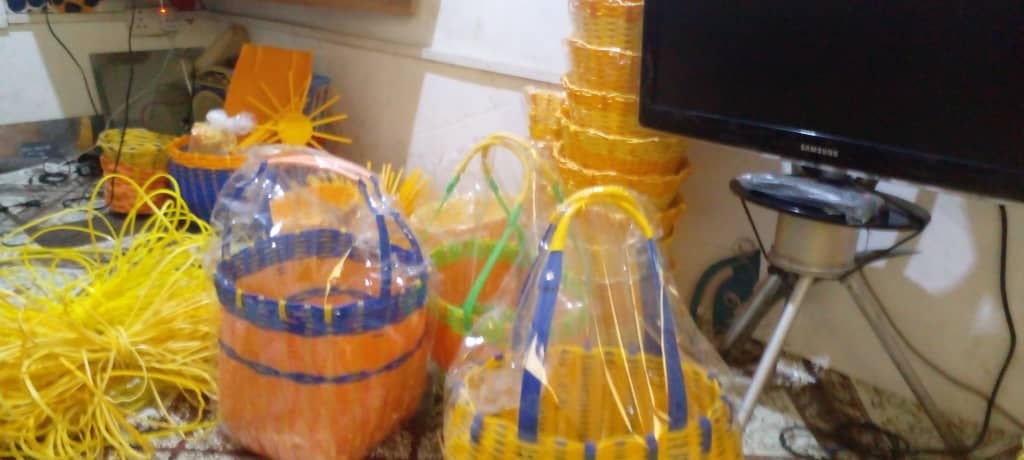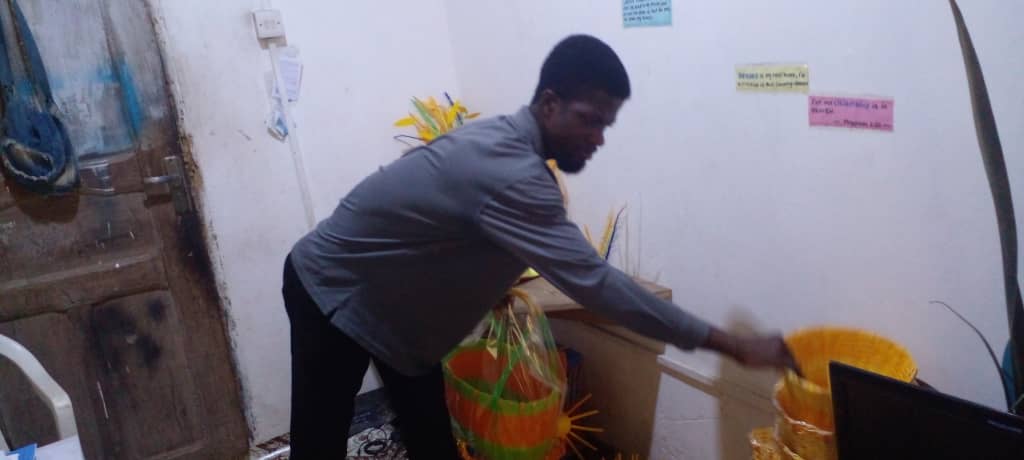GNA feature by Godwill Arthur-Mensah
Accra, Nov.04, GNA- Throughout history, there have been individuals whom the Lord filled with divine spirit, and with the ability, intelligence and knowledge in every kind of craft and made artistic designs with excellence.
Background
The names Bezalel and Oholiab are two persons mentioned in the Bible who have divine craftsmanship. For instance, in Exodus 31:1-5 Bezalel son of Uri, was mentioned for having divine craftsmanship to design the tabernacle and its furnishings.
In this modern era, the Lord still gives divine inspiration to people, and one of such people is Michael Ainoo, a 34-year-old plastic entrepreneur.
He uses a simple device to cut plastic gallons, popularly referred to as “Kufuor gallon” into strips or pellets and skillfully uses the pellets to weave domestic items like baskets, dustbins, shopping bags, hamper containers, serving trays, flowerpots etc. helping to minimise plastic pollution on the environment.
Youngman Ainoo hails from Ekumfi Agyankwa in the Ekumfi District of the Central Region, but is currently residing in Gbawe-Bulemin, a suburb of Accra.
Ainoo calls his enterprise “Halleluyah Creation” where he uses simple tools like scissors, pliers, screwdrivers and soldiering iron to design and tighten the objects.
” I started this enterprise about a year ago, and how the idea came to mind was amazing. My nephew who was staying with me some time ago needed an object to fan a Coal pot. So, I cut the plastic gallon and gave a portion to him to use it. After some time, I asked myself, can’t I use this piece of plastics to do other things else?
Ideas on board
“And so, I decided to cut the rest of the gallons into strips using a self-made blade-like device. I wove a basket with it using the pellets, and we put our fresh fruits and vegetables in it. After making the basket, an image of a sunflower came to mind and so, I used the rest of the plastic to design a flower-shaped item and pasted it in our room,” Ainoo recalled.

The young man indicates that he did not learn the trade from anyone, but it came to him by divine inspiration.
Ainoo told the Ghana News Agency (GNA) during an interaction at his residence that, he is willing and ready to teach anyone interested to learn the trade.
Difficult process
“It’s very difficult weaving these plastic pellets, and so, it takes a lot of time to complete one object. I will be very happy if I can get an industrial machine to help me to do it faster and weave more items.
“The drudgery of designing the items required lots of patience and dedication because I must wash the gallons thoroughly and remove every stain on them,” said Ainoo.
Ainoo weaves 10 baskets per week and sells them to some market women who sell plastic bowls in Mallam and Sakaman markets in Accra.
The young entrepreneur says he makes GHc300 profit per week after deducting the cost of the raw materials and transportation.
Depending on the number of items he sells a week, Ainoo believes he could make higher profits. “If I get modern equipment, it can boost my work tremendously”.
Challenges
His headache now is getting sufficient raw materials for the work, saying; “I often move from shop to shop looking for gallons to buy, especially from traders who sell cooking oil. Sometimes I can walk the whole day without getting any gallon to buy”.
Ainoo says he would require between GHS 8,000 and GHc10,000 to expand his enterprise. Asked what he will invest the money in, he says the money will go into purchasing tools and raw materials for his work.
Currently, Ainoo does not have a shop of his own and operates from his single bedroom, which he had used the curtain to partition it.
He believes in the next three to five years, he will make sufficient profit from his business to rent a shop.
After going through difficulty in designing the items, Ainoo says marketing the products has become a challenge and, therefore, often takes the items to shops or markets to showcase them to the public. Ainoo indicates that people really admired the beauty of the items and praised him for his creativity and efforts.
“Sometimes, I receive orders from people to make the items for them but because of lack of raw materials and I couldn’t meet their orders on time,” said Ainoo.
Ainoo expresses his determination to continue with the business despite the hurdles. “The items I made are very durable and don’t fade easily and so sometimes people ask me whether I painted them and so, I take time to explain the processes to them. I mostly use new gallon pellets and so the items looked very new and bright”.
“I believe God inculcated this gift in me to help my community, and so, I feel so much joy whenever I design the items. In fact, am ready to teach others for free so that we can reduce youth unemployment in the country, ” Ainoo said, beaming with smile.
Data/Statistics on Plastic Generation, Recycling and Re-use
According to Plastic Oceans International, plastic is one of the most widely used materials globally, with over 450 million metric tonnes produced annually.
Plastic production has sharply increased nearly 230-fold in the last 70 years. In the 1950s, the world produced just one to two million tonnes of plastics.
In the modern era, plastics have added much value to human lives because they’re cheap, versatile and sterile materials used in various applications, including construction, home appliances, medical instruments and food packaging.
However, only about 9% of plastic waste is recycled globally. The remaining 91% are either incinerated, end up in landfill sites or disposed of in other ways.
Plastic pollution is a major environmental challenge in Ghana with dire effects on marine and terrestrial ecosystems.
The pollution is caused by the lack of plastic waste management infrastructure for collection, sorting and recycling. Insufficient financing and support mechanisms to attract high-scale investment, therefore, creating barriers towards building and manufacturing plastic management facilities.
According to the World Economic Forum, Ghana generates around 0.84 million metric tonnes of plastic waste annually, increasing by 5.4% per year, with plastic waste growing by 2.2% per annum alongside a 3.4% increase in per capita plastic consumption.
Dr Ebenezer Laryea, an Associate Professor for Sustainable Development, University of Northampton, UK, says about 840,000 metric tonnes of plastic waste is collected annually in Ghana, out of which only 9.5% is recycled.
Dr Laryea, also the Director of Fresh Produce Impact Hub, says a reduction in the use of plastics will help protect the environment, and thus, called for concerted action and dialogue by players in the plastic value chain to ensure their proper management in the country.
The Ocean Health Index for Ghana says there has been a consistent decline of plastic usage in Ghana from 2017, with annual imports of raw plastic materials estimated to be 2.58 million metric tonnes, of which 73% of the total plastic imports end up as waste materials. It says plastic re-use represents an insignificant 9% of the total imported plastic materials. The analysis showed that the daily average solid waste generated per head in Ghana is 0.47 kilogram.
Mr Thomas Narh Korley, the Coordinator of Zoomlion Foundation, has, thus, underscored the need to fostering “a sense of responsibility” among young people to adopt sustainable behaviours in plastic waste management.

He recommended the setting up of clubs in basic and senior high schools to regularly sensitise pupils and students on responsible practices in disposing of plastic waste.
Ms Mary Aka, the Head of Internal Audit in Environment, Health and Safety at the Blue Skies (producers of packaged fruit juice), says the company has been encouraging patrons of its products to gather the bottles after use. An arrangement mechanism has been put in place for collection of the bottles and hand them over to a recycling company.
It is estimated that global plastic waste amounts to 2.01 billion metric tonnes annually, of which 33% is not properly managed.
Environmental/Health Implications of Plastic Waste
It is estimated that plastic waste contributes to 80% of marine pollution, and harm marine ecosystem because they entangle marine species, causing injuries or fatalities to them.
Also, plastic production releases greenhouse gases such as carbon dioxide, methane, nitrous oxide and other synthetic chemicals, which contribute to climate change.
Plastic waste littered on the landscape often ends up in oceans and other water bodies, affecting wildlife habitats and marine life.
Besides, whenever microplastics enter food chains, they have adverse effects on human health with toxic chemicals like BPA, Phthalates and PFOS, often linked to cancer and reproductive and neurological problems.
Additionally, the consumption of microplastics through food, water and air, could harm human organs exacerbate respiratory conditions like asthma and increase one’s cancer risk, disrupting hormone balances and the reproductive system.
Economically, it costs billions of dollars to destroy plastic waste since they’re non-biodegradable.
It is on that basis, that the Ghana National Plastic Action Partnership (NPAP) was established, under the leadership of the Ministry of Environment, Science, Technology and Innovation, as a platform for multi-stakeholder cooperation to combat the plastic pollution menace. Plastic pollution is a problem that requires the involvement of the entire plastic value chain producers, consumers, and collectors to address it.
Stakeholder Recommendations on Plastic Management
At a stakeholders’ forum held in Accra attended by major plastic industry players, some of the participants suggested that the citizenry must patronise reusable plastic bags, containers and water bottles.
They must choose products with minimal packaging, avoid microbeads and single-use plastics, as well as adopting recycling and composting as part of efforts to save the environment and humanity.
For instance, recycling plastic waste will help reduce greenhouse gases such as carbon dioxide, methane, nitrous oxide, and various synthetic chemicals.
The recycling process can take the form of sorting, shredding, melting and pelletizing.
In that vein, young entrepreneur, Ainoo’s unique skills of using plastic pellets for making various domestic items is good for the environment, human health and opens job creation opportunities.
His work will help in tackling plastic waste in Ghana, thus transforming landfill-bound plastic into useful re-usable items.
It will also reduce reliance on virgin plastics, therefore, conserving resources and minimising environmental impact of plastics.
A stitch in time saves nine.
GNA